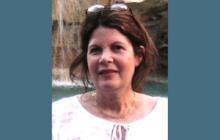University of Washington History Professor Susan Glenn presented the annual David Belin Memorial Lecture in Jewish Public Affairs at the University of Michigan in March, where she spoke about "The Jewish Cold War: Anxiety and Identity in the Aftermath of the Holocaust." Concurrently, a profile of Professor Glenn was featured in the March 2014 issue of the Washtenaw Jewish News in which she discussed her own Jewish identity. In it Glenn explains her own take on an exercise in which she asks her students to draw a series of concentric circles around themselves describing who they are and then asks "what would be the closest circle to you? What would be the first word out of your mouth if someone asked you to describe yourself?"
Glenn doesn't think twice about her own innermost circle. "I would say 'Jewish,' " she says, "oddly enough, because I'm not observant at all, and I'm not connected to any Jewish religious institution. But 'Jewish' is the core of my identity." ..."My sense of being Jewish has to do with my location historically," she notes. "I grew up with family stories about pogroms in Russia. I had a very strong Jewish consciousness tied to my sense of family history. And I still feel that way."
Glenn's current research focuses on the question of how Jews define what being Jewish means. Her lecture at the University of Michigan explored how liberal Jewish intellectuals clashed with Jewish ethnic particularists and nationalists in the middle of the 20th century. Her first book, Daughters of the Shtetl: Life and Labor in the Immigrant Generation (Cornell University Press, 1990), focuses on Jewish women in the garment industry in the early 20th century. Her second publication, Female Spectacle: The Theatrical Roots of Modern Feminism (Harvard University Press, 2000), is about women in the theater, a number of whom were Jewish. Most recently, she collaborated with Naomi B. Sokoloff in editing Boundaries of Jewish Identity (University of Washington Press, 2010), an interdisciplinary collection of articles that considers historical and contemporary debates about who and what is "Jewish."
Glenn's books appear to approach feminism and Judaism from entirely different perspectives, but she notes that they all share a common thread. "That thread," she says, "is why Jewishness matters to Jews. The terms on which it mattered across all these projects were not religious, but secular, and based on cultural patterns and expectations." For example, she points to Sarah Bernhardt, a popular late 19th-century French actress who is featured in Glenn's second book. Bernhardt was born into a Jewish family, but was baptized as a Catholic. "Everyone knew she was a Jew," Glenn notes. "And stereotypes about Jewishness attached themselves to her, and that made her exotic and added to her desirability. I became interested in her inability to distance herself from the notion of her Jewish 'blood,' and in the idea that it's very difficult to escape your Jewishness." She talks about how Jews will often "name and claim" each other based on what she refers to as "blood logic": the idea that having a Jewish mother will always qualify you as a Jew. In addition, she describes what is sometimes called the "Jewdar" phenomenon: when Jews scan the room to see who else looks Jewish. "My point," says Glenn, "is that Jews always drew—and continue to draw—each other back into the fold in some way, and that's a paradox, because they also fought—and continue to fight—about who belongs in the fold. People have different stakes in what Jewish identity means. These contests are longstanding, are very much alive today, and probably always will be."
See page 3 of the March 2014 Issue of Washtenaw Jewish News to read the full profile on Professor Glenn.
In July Professor Glenn will present a paper on "Coming to Terms with Postwar Antisemitism: the 1960 'Swastika Epidemic' and the Politics of Interpretation" at the European Association for Jewish Studies Congress, which will be held at the Ecole Normale Sup‚rieure, Paris.
